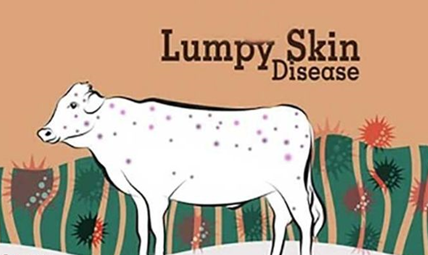- Vaccination of cattle in progress
- Till date, 3.67 lakh animals have been vaccinated
- Cattle owners are being informed about the measures to prevent lumpy skin infection in their livestock
- Temporary check posts installed in 85 border villages to monitor and prevent the movement of cattle from other states
Raipur (thestates.news) No case of lumpy skin disease in cattle has been reported in the state so far. In view of the current scenario, the field staff of the veterinary department has jumped into action mode. They are continuously visiting the villages in different parts of the state, creating awareness among the cattle owners to prevent the spread of lumpy disease in cattle there. In Chhattisgarh, animal vaccination drive is also in progress. LSD in-charge Dr. Shartiya informed that so far 3.67 lakh animals have been vaccinated in the state, against the target of 8.20 lakh animal vaccinations.
As the cases of lumpy skin disease among cattle started making it to the headlines from different states of the country, immediate instructions were issued in Chhattisgarh to take all kinds of preventive measures for safety of the livestock in the state. Chhattisgarh has 18 of its districts bordering other states. And to prevent incoming of sick animals from these states, check posts have been set up in 85 border villages. Moreover, organizing of cattle fairs has been banned in these villages, and the middlemen are also being monitored.
It is noteworthy that Lumpy Skin Disease is a viral infectious disease spreading among the cattle, especially cows and buffaloes. The main carriers of this disease are mosquitoes, flies and mites, through which this infection spreads to healthy animals. Animal suffering from this disease show the symptoms of moderate fever for 02 to 03 days, after which round lumps start appearing on their skin. Fever for prolonged period of time adversely affects the appetite of the animals, thereby reducing their milk production capacity, strength and overall efficiency. Diseased animals recover in two to three weeks. But due to physical weakness, milk production is affected for several weeks.
No case of this disease has been reported in the state so far. As a precaution, organizing of cattle fairs and haat-bazaars has been temporarily banned in the districts. In the border villages, Got-Pask Vaccine is being administered to the cattle, as a preventative measure.
Adequate medicines have been arranged in the regional institutions to provide immediate medical facilities in case any animal is found infected with this disease. Besides, sufficient budget has been allocated to the districts for crisis management, running preventive vaccination drive and for procurement of vaccines on time. Livestock owners have been advised to spray anti-bacterial disinfectants in their cattle-shed to prevent this disease.










